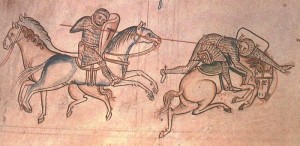
By Duncan F. Grimm (History major, class of 2015)
Thursday, 18 October, 2012 – Professor Richard W. Kaeuper of the University of Rochester discussed the Middle Ages with the Trinity community, asking the leading question that at one time or another all historians must face: Why is it important to study the past? While this question seems to plague (no Medieval pun intended) many academics, Kaeuper embraces the challenge. By the end of his lecture, he had fully illuminated the supposed Dark Ages, painting a picture of a pivotal society that had experienced a renaissance before the Renaissance. One of the most intriguing qualities of the Middle Ages, Kaeuper argued, was that comparative to our time, events seem to take place in slow motion, spanning years if not decades before a conclusion is reached. For historians, this pace of change offers a window often not found in an era so critical to the development of Western civilization and the character of the individual.
This was not a period of stasis, a mere place-holder between the supposed glory of the ancient world and the Italian Renaissance, Kaeuper claims. This was the birth of government. The study of the early 1000s allows us to see the roots of Western society unfolding. The financial reforms and common law of Edward I between 1272 and 1307 delineated the benefits of a state and population who worked together towards common interest and compromise.
Furthermore, literature of the time reflected the fact that government could not have grown if the people did not want more stability in their lives. While much literature describes the squabbling of petty lords, the king is almost always held above the storm, perceived as a rallying symbol for the people. The notion that the overall source of good came from the king was also a dramatic shift from previous years of individuals “belonging” to lords or lesser nobles all jockeying for power. An excellent view into this world of intense violence, the “Song of Roland” is a mid-twelfth century epic poem that has survived to offer an equally important but under-appreciated perspective on governance.
Kaeuper closed with thoughts on chivalry, purporting to show for the most part our view of chivalry is a Victorian notion, an attempt by the British to connect their young and unscrupulous young men with the honor culture of medieval times. This being said, the chivalry that existed in the Middle Ages was a strong warrior code–one of the few times in history that personal violence dictated matters of state. A world that valued aestheticism as much as prowess on the battlefield, the Middle Ages are unfortunately quite often dismissed or misunderstood as a backward period of little development.
Given the power that this warrior and religious culture held over the West, with formal government in its fledgling stages, Kaeuper’s frightening question remains a timeless one: “Can religious or chivalric ideals be co-opted by those in power to manipulate a society to their own ends?” Definitely worth thinking about in a day and age when certain elements of our own cultures are as polarized as they were 800 years ago.
Richard W. Kaeuper is a professor of European History at the University of Rochester and has published several books on the above subjects.
http://www.rochester.edu/college/his/faculty/kaeuper_richard/index.html